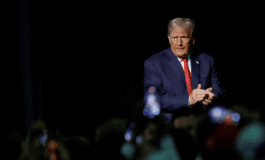President moves to close Guantanamo, end torture, work on Mideast peace

|
|
U.S. President Barack Obama (L) listens to newly appointed Mideast envoy George Mitchell at the State Department in Washington January 22, 2009. REUTERS/Kevin Lamarque |
“We are not going to continue with a false choice between our safety and our ideals,” Obama said, after signing the orders on Guantanamo.
Obama also signed other orders and memoranda that seemed a rebuke of policies that formed the backbone of Bush’s global war on terror, including closing “as expeditiously as possible” all secret CIA prisons overseas, banning the use of waterboarding and other harsh interrogation tactics not authorized by the Army Field Manual, requiring the International Red Cross be granted access to any individual detained by the U.S. in any armed conflict and requiring that all U.S. detainees be treated in accord with at least the minimal protections of the Geneva Conventions.
“With a stroke of a pen, President Obama initiated this nation’s return to the rule of law,” said Amnesty International USA Executive Director Larry Cox.
He praised Obama for “moving quickly to restore the United States’ role as a positive force for human rights in the world.”
U.S. House Republican Leader John Boehner, not pleased with the moves, said closing Guantanamo might place the country in peril.
“The Guantanamo Bay prison is filled with the worst of the worst – terrorists and killers bent on murdering Americans and other friends of freedom around the world. If it is closed, where will they go?”
Signaling that he plans to get involved in the Mideast peace process early in his term, as promised to Arab Americans by his campaign before the election, Obama’s first phone call to a foreign statesman as president was made to Palestinian President Mahmoud Abbas on Wednesday. And on Thursday, Obama and Secretary of State Hillary Rodham Clinton announced Mitchell’s hiring.
After the announcement, Mitchell said “I don’t underestimate the difficulty of this assignment.”
The son of a Lebanese mother and an Irish father, Mitchell, 75, is a former federal judge who spent almost 15 years in the Senate representing Maine until 1995.
He served as chairman of negotiations in once-volatile Northern Ireland that led to the 1998 Good Friday peace agreement.
“From my experience there, I formed the conviction that there is no such thing as a conflict that can’t be ended,” Mitchell said. “Conflicts are created, conducted and sustained by human beings. They can be ended by human beings.”
President Bill Clinton in 1999 awarded him the Presidential Medal of Freedom, the highest U.S. civilian honor.
Mitchell has experience in the Middle East, having compiled an influential report in 2001 that called for a halt to Israeli settlements and greater Palestinian efforts to crack down on terror. The “Mitchell Report” was praised for its impartiality and became the basis for later peace initiatives.
“The situation in the Middle East is volatile, complex and dangerous. But the president and the secretary of state have made it clear that danger and difficulty cannot cause the United States to turn away,” he said.
Sallai Meridor, Israel’s ambassador to the U.S., said Thursday in a statement “Israel holds Sen. Mitchell in high regard and looks forward to working with him on taking the next steps towards realizing a future of peace and security for Israel and her neighbors.”
Laila Al-Qatami, communications director for the American-Arab Anti-Discrimination Committee said, “George Mitchell is an exceptionally well qualified and highly respected public servant. Known for his ability to generate good will, he has a proven record of leadership and negotiating peace. ADC hopes he will have full authority and support to actually reach an end to Israeli-Palestinian conflict and to create a just and durable peace agreement.”
James Zogby, president of the Arab American Institute, described the appointment as “great news for those seeking Middle East peace. In selecting an envoy as big as the solution he seeks, the President will send an important early message that Middle East peace is a priority in his administration.”
Mitchell spoke at a banquet of the Arab American Political Action Committee (AAPAC) in Dearborn in 2000 as a representative of then-presidential candidate Al Gore.
Abed Hammoud, endorsement chair of AAPAC and an active democrat, said “the appointment of George Mitchell is an indication of the seriousness that President Obama brings to the situation in the Middle East. Mr. Mitchell will bring a balanced approach to the peace process that was lost during the last administration, which went too far to the Israeli side.”
Obama and Clinton also announced Thursday the hiring of Richard Holbrooke to coordinate policy in Afghanistan and Pakistan, where the U.S. military is fighting a growing insurgency. Holbrooke brokered a 1995 truce among warring factions in Bosnia.






Leave a Reply